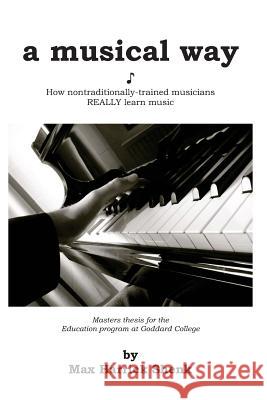A Musical Way: How Non-Traditionally Trained Musicians REALLY Learn Music » książka
A Musical Way: How Non-Traditionally Trained Musicians REALLY Learn Music
ISBN-13: 9781495382710 / Angielski / Miękka / 2014 / 104 str.
"They were all terrible sight readers in (Duke Ellington's) band. Ellington's sidemen didn't learn Ellington's music by reading it. They got it by playing every night." Billy May, jazz arranger Q: "How did you learn to play the saxophone?" Lester Young: "Just picked up the m-----f---er and started playing it " "A lot of the boys didn't read music, but they had a good mind-- we called it a good ear. All we wanted to know was how did it sound... wasn't nothing written down." Louis Armstrong Many of the greatest musicians of the last hundred years learned music "outside of the academy: " with little or no formal training, musicians like John Lennon, Merle Haggard, Burt Bacharach, Paul Simon, and others became greater than many musicians who took lessons their whole lives. How did these and other non-traditionally trained musicians learn music? Are there common ways that non-traditionally-trained musicians follow to become proficient as players, singers and composers in spite of their lack of formal training? And can those ways be formalized into a musical pedagogy that could, in fact, be a more effective method of mentoring musicians than the traditional "academic" approach of lessons, theory and study? In A Musical Way, Max Harrick Shenk explores the ways that we learn music in spite of formal training, reflecting on his own experiences as a listener, songwriter and musician, and drawing on the experiences of musicians who not only learned music without lessons or schooling, but often didn't even realize that they were learning. Shenk takes those experiences and proposes a "musical way" that a teacher could use to help a musically-interested student express his or her musical ideas, without getting hung up or stuck on technique, theory or an uninteresting, uninspiring repertoire. "I realized I was free to play music any way I wanted to," he writes about one of the many breakthrough moments in his own informal musical education. Fostering and encouraging that freedom in students is Shenk's "musical way." Interwoven with quotes, anecdotes and even excerpts from Shenk's own fiction, A Musical Way will help listeners, players and teachers understand the ways that we learn music, and inspire and encourage them to not only teach others, but to make music of their own.
Zawartość książki może nie spełniać oczekiwań – reklamacje nie obejmują treści, która mogła nie być redakcyjnie ani merytorycznie opracowana.











